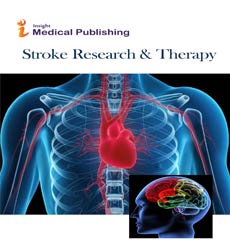Focus on Vascular Contributions to Dementia and Alzheimer's Disease
Anurag Trishan*
Anurag Trishan* and Abhiram
Department of cardiology, All India Institute of Medical Sciences, New Delhi, Delhi, India
- *Corresponding Author:
- Anurag Trishan
Department of cardiology,
All India Institute of Medical Sciences,
New Delhi, Delhi, India;
E-mail: anuragtri498@gmail.com
Received Date: October 08, 2021; Accepted Date: October 22, 2021; Published Date: October 29, 2021
Citation: Tristan A, Abhiram (2021) Focus on Vascular contributions to Dementia and Alzheimer's Disease. Stroke Res Ther Vol.5 No.5: 124.
Description
Cerebrovascular stroke is a disorder of the veins in and around the brain. It happens when the portion of the mind doesn't receive sufficient blood, to work naturally (called "ischemia") and the cells die (localized necrosis) or when a vein ruptures (hemorrhagic stroke). Ischemia is more normal than bleeding (hemorrhage) and is caused when a vessel (vein) providing blood to the cerebrum becomes limited by a fatty deposit called plaque. It is also called atherosclerosis. This plaque can rupture and form a blood clot that, alongside bits of plaque, can travel to veins further in the brain and block them causing, a stroke. Furthermore, clusters can emerge in the heart (called a "thrombus") and travel to the cerebrum (called an "embolus"). Durable harm to synapses can result.
Symptoms of stroke
Normal indications of stroke are sudden loss of movement, loss of sensation in the body (especially on one side), slurred discourse, and fragmented loss of vision or two fold vision, loss of balance. Loss of bladder and entrail control can moreover occur. Changes in conduct and character may occur. On the off chance that these incidental effects are reformist and genuine enough to interfere with ordinary activities, they are called dementia or "major neurocognitive issue".
Cognitive decay related to stroke is regularly called vascular dementia or vascular scholarly weakness to recognize it from various types of dementia. In the United States, it is the second most ordinary sort of dementia after Alzheimer's infection.
Vascular dementia may be preventable, yet given that the secret vascular infection (like hypertension) is perceived and treated early individuals, who have had a stroke have more danger of creating dementia than people who have not experienced a cardiovascular failure. Around 1 out of 4 people who have had a stroke will continue to cultivate signs of dementia. Vascular dementia is generally usual in more seasoned individuals, who are energetic to have vascular disorders. It is more ordinary in men than in women.
Dementia treatment is directed toward managing symptoms and recognizing whether there might be a reversible reason. Medications, for example, acetyl cholinesterase inhibitor (e.g., galantamine, donepezil) helps to slow the progression of intellectual changes. However the impact of drugs cannot prevent eventual worsening of the underlying condition. Unsettling and other enthusiastic concerns are generally addressed as part of the general treatment plan.
Alzheimer's disease
Specialists think between 60% to 80% of individuals with dementia have this illness. In more than 5 million Americans have been determined to have Alzheimer's. It's what a great many people consider when they hear "dementia". If somebody has Alzheimer's, they'll notice manifestations, such as cognitive decline and inconvenience arranging and doing recognizable undertakings.
The symptoms are gentle from the outset yet deteriorate over several years. Our companion or relative may:
• Have issues talking or composing
• Lose things and not be able to backtrack to discover them
• Show misguided thinking
• Have state of mind and character changes
Conclusion
If somebody gets determined to have dementia, it implies they have a progressive and sometimes chronic brain condition that causes issues with their reasoning, conduct, and memory. Dementia itself isn't an infection, yet a disorder. It will deteriorate over the long run. However, medications may slow that decrease and help with indications, for example, conduct changes.
Open Access Journals
- Aquaculture & Veterinary Science
- Chemistry & Chemical Sciences
- Clinical Sciences
- Engineering
- General Science
- Genetics & Molecular Biology
- Health Care & Nursing
- Immunology & Microbiology
- Materials Science
- Mathematics & Physics
- Medical Sciences
- Neurology & Psychiatry
- Oncology & Cancer Science
- Pharmaceutical Sciences
